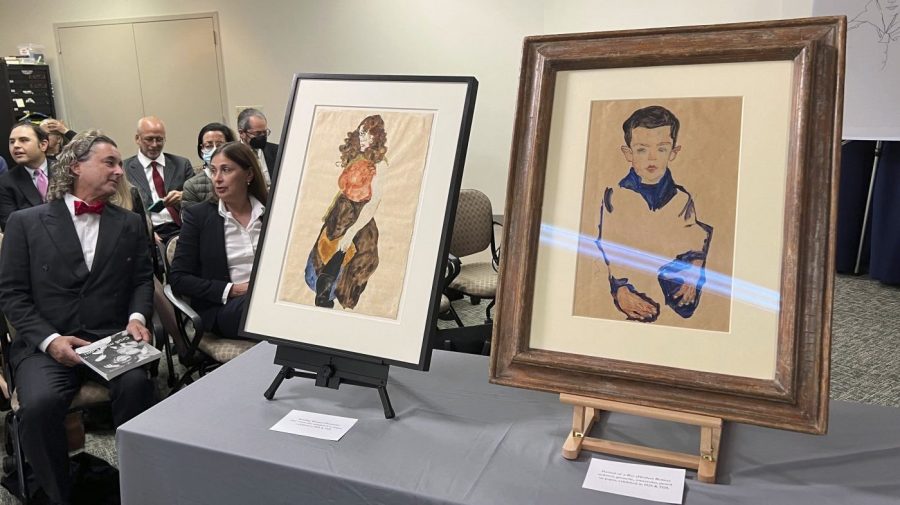Politics
Handwritten Evidence of Holocaust Theft Urges Congressional Action

Newly surfaced handwritten documents reveal the extent of theft during the Holocaust, prompting calls for immediate action from the United States Congress. These documents, which provide detailed accounts of the looting of art and cultural artifacts, illustrate a systematic eradication of Jewish identity and heritage from 1933 to 1945.
The Holocaust is often recognized for its horrific loss of life, but it also represents a grave theft of culture and memory. The recent findings highlight how cultural items were not just destroyed but were deliberately taken, significantly impacting Jewish communities worldwide.
Evidence of Systematic Theft
Among the documents are records from various institutions detailing the systematic looting that occurred across Europe. According to the Holocaust Claims Conference, the evidence supports claims that thousands of pieces of art, books, and religious artifacts were stolen and have yet to be returned.
The Yad Vashem Holocaust memorial in Israel has also emphasized the importance of these documents in understanding the full scope of the cultural loss. “This is not just about missing art; it’s about the erasure of a culture,” said Avner Shalev, the chairman of Yad Vashem.
The revelation of these documents comes at a crucial time as discussions about restitution and reparations for Holocaust survivors and their descendants gain momentum. The push for Congress to act is bolstered by a growing recognition of the need to address not only the physical but also the cultural ramifications of these historical injustices.
Legislative Response and Cultural Reclamation
Legislators are now faced with the challenge of developing a framework for the recovery of stolen cultural property. There is a call for a comprehensive review of existing laws related to art restitution and for the establishment of a dedicated task force to address these issues.
The United States Congress has previously acknowledged the importance of addressing Holocaust-related claims, but the recent evidence underscores the urgency for more decisive action. Advocacy groups are lobbying for legislation that would streamline the process for reclaiming stolen artifacts and ensure that cultural heritage is returned to rightful owners or their descendants.
In light of these developments, the international community is also being urged to take a proactive stance on cultural restitution. Countries like Germany, where much of the looted art ended up, will play a critical role in addressing these historical wrongs.
The conversation around Holocaust restitution is not merely about the return of objects; it is about restoring dignity and memory to communities that have suffered immeasurable loss. As discussions unfold in Congress, there is hope that these documents will serve as a catalyst for meaningful change in the way cultural theft is addressed on a global scale.
With the weight of history behind them, advocates are urging lawmakers to act swiftly to ensure that justice is served for those who endured the pain of loss during the Holocaust.
-

 Lifestyle3 months ago
Lifestyle3 months agoLibraries Challenge Rising E-Book Costs Amid Growing Demand
-

 Sports3 months ago
Sports3 months agoTyreek Hill Responds to Tua Tagovailoa’s Comments on Team Dynamics
-

 Sports3 months ago
Sports3 months agoLiverpool Secures Agreement to Sign Young Striker Will Wright
-

 Lifestyle3 months ago
Lifestyle3 months agoSave Your Split Tomatoes: Expert Tips for Gardeners
-

 Lifestyle3 months ago
Lifestyle3 months agoPrincess Beatrice’s Daughter Athena Joins Siblings at London Parade
-

 World3 months ago
World3 months agoWinter Storms Lash New South Wales with Snow, Flood Risks
-

 Science3 months ago
Science3 months agoTrump Administration Moves to Repeal Key Climate Regulation
-

 Science2 months ago
Science2 months agoSan Francisco Hosts Unique Contest to Identify “Performative Males”
-

 Business3 months ago
Business3 months agoSoFi Technologies Shares Slip 2% Following Insider Stock Sale
-

 Science4 months ago
Science4 months agoNew Tool Reveals Link Between Horse Coat Condition and Parasites
-

 Sports3 months ago
Sports3 months agoElon Musk Sculpture Travels From Utah to Yosemite National Park
-

 Science4 months ago
Science4 months agoNew Study Confirms Humans Transported Stonehenge Bluestones









